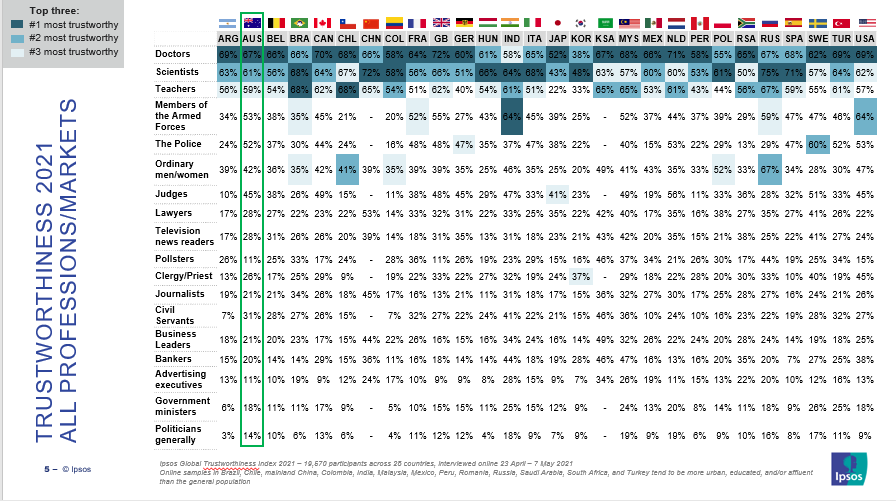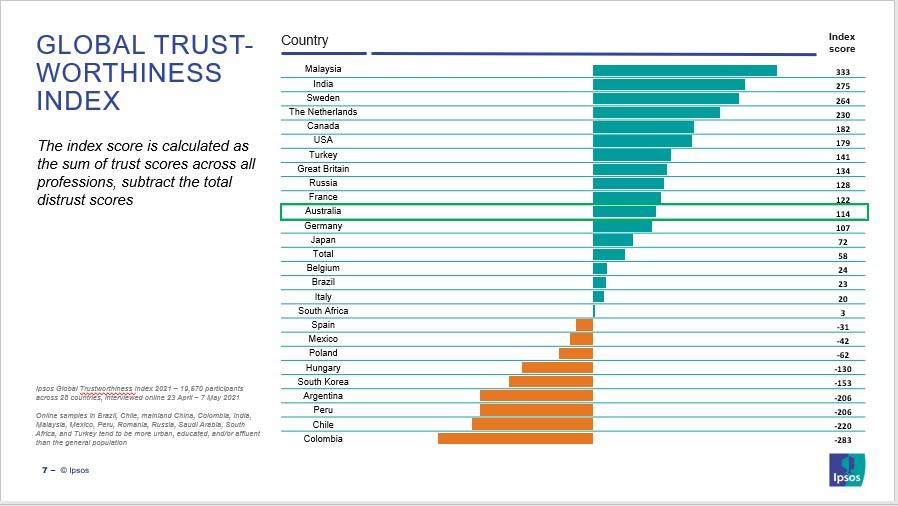Doctors and Scientists hold their position as Australia’s most trusted professions
A new Ipsos poll reveals that in 2021 doctors are considered the world’s most trustworthy profession. The Ipsos Global Trustworthiness Index has reported the level of trust afforded to many types of professionals since 2018, providing comparisons between the pre-pandemic world and where we are today. Across 28 markets around the world, a Global Country Average of 64% rate doctors as trustworthy, followed by scientists at 61% and teachers on 55%. At the foot of the trust table, only 10% on average believe politicians are trustworthy, 14% say the same about government ministers, and 15% advertising executives.
The Key Australian Findings
Two thirds (67%) of Australians surveyed rated doctors as the most trustworthy profession in 2021, in our survey conducted before the third wave of Covid19 came to Australian shores via the Delta strain. This is in line with the 2019 data (69%), and sees Doctors maintain their place at the top of the list.
Scientists (61%) were again in second place followed by teachers (59% down 1%) and members of the armed forces (53% down 5%). The order of professions remains unchanged to those in 2019. Global averages place these top professions in the same order as in Australia.
Australian still don’t trust in their politicians, with over half reporting the profession untrustworthy (53%). This however is a decrease from pre-pandemic times, in 2019 when 67% of Australians were distrusting of politicians. Around a half of Australians surveyed also considered advertising executives (50%) and Government ministers (48%) untrustworthy.
 Australia displayed a positive index score overall, along with most of the other countries surveyed. A positive index score means most of the professions listed have net positive scores – so more people consider them to be trustworthy rather than untrustworthy.
Australia displayed a positive index score overall, along with most of the other countries surveyed. A positive index score means most of the professions listed have net positive scores – so more people consider them to be trustworthy rather than untrustworthy.

Ipsos Australia Director, David Elliott, said: “It is again encouraging to see evidence that haven’t all lost as much faith in experts as we have been led to believe. This study shows that in 2021, as it did in 2019, that scientists and Doctors are held in high esteem both here and around the globe.
“The high levels of trust placed in many professions of crucial importance to our society are encouraging as they indicate that we don’t think society is completely broken. We still have a lot of trust in many important professions, like doctors, teachers, the armed forces and the police. What is more concerning for us as a society are the low levels of trust in politicians, government ministers, bankers, journalists, clergy/priests and even business leaders.”
Global Findings in detail
While many professions’ positions have barely shifted over the last few years, one notable impact during the pandemic has been a boost to the standing of doctors, moving them above scientists who were the top profession in previous waves. On average, almost two-thirds of those in 22 countries which have been studied over the three waves rate them as trustworthy (64%), an increase of seven percentage points since 2019 and nine points ahead of their score in September 2018. By contrast, the proportion saying the same about scientists has stayed at about six in ten across all three years (61% in 2021).
Great Britain leads the world in trusting doctors with 72 per cent rating them as trustworthy, a proportion which has risen slightly since 2018 (67%). Doctors are similarly highly trusted by Dutch people (71%) and Canadians (70%).
Yet the biggest changes in trust in doctors over the past few years are seen elsewhere:
- In Hungary and Chile, the proportion rating doctors as trustworthy has risen by 19 percentage points between 2019 and 2021. Over the same period there have also been big increases in Saudi Arabia (+17ppt), Poland (+12ppt), Brazil and Russia (both +10ppt).
- However, there are some countries which remain less likely to see doctors as trustworthy. South Koreans are the least trusting on just 38%, but this is a ten-percentage point rise since 2018. The Japanese are the second-least likely to find doctors trustworthy on 52%, but there has been a 13 percentage-point increase on this score compared with the 2019 pre-pandemic survey wave. Despite these scores still being low by global standards, it should be noted that this is due to many giving a mid-score, rather than considering doctors to be untrustworthy.
- Mexico is the only country to register a fall in the trustworthiness of doctors between 2019 and 2021, with trust falling from 71% to 66%
Many other professions remain at similar levels to those recorded in pre-pandemic waves, including politicians, who have been bottom of the list in all three years. This year just ten per cent on average rate politicians as being trustworthy.
Scientists remain seen as trustworthy by six in ten of the global sample (61%) and their ratings have stayed the same in many markets over the past two years. The largest increases in trust in scientists since 2019 have been recorded in Saudi Arabia (+17ppt), Hungary (+13ppt), Brazil (+9ppt) and Canada +8ppt), while the biggest drops have been in Argentina (-11ppt) and Mexico (-8ppt).
Teachers remain the third-most trustworthy profession for the third wave in a row, with 55% rating them as trusted. As with scientists, in many countries trust scores for teachers have moved little through the pandemic, but there has been a sixteen percentage-point increase in trust for teachers in Saudi Arabia between 2019 and 2021, as well as nine point rises in Hungary and Japan. Over the same period perceptions of trustworthiness have improved in Malaysia (+8ppt), Italy and South Africa (+6ppt), while they have fall in the US (-6ppt) and Argentina (-5ppt).
Globally, three professions stand out as the least likely to be considered trustworthy: government ministers, advertising executives and politicians. This year the Global Country Average has 14% scoring government ministers and 15% advertising executives one or two out of five for trustworthiness and just 10% doing the same for politicians. While these scores are similar to previous years, the level of distrust in these professions has fallen somewhat. Between 2019 and 2021 the proportion who see politicians as untrustworthy across 22 countries has fallen four points from 66% to 62%, while distrust of government ministers has dropped by five percentage points (from 58% to 53%). Advertising executives have also seen a shift; in 2019 nearly half considered them untrustworthy (45%) but now that figure stands at four in ten (39%).
This study did not have any external sponsors or partners. It was initiated and run by Ipsos, because we are curious about the world we live in and how citizens around the globe think and feel about their world.
These are the findings of an Ipsos online survey conducted between 23 April and 7 May 2021.
The survey was conducted in 28 countries around the world, via the Ipsos Online Panel system in Argentina, Australia, Belgium, Brazil, Canada, Chile, China, Colombia, France, Germany, Great Britain, Hungary, India, Italy, Japan, Malaysia, Mexico, the Netherlands, Peru, Poland, Russia, Saudi Arabia, South Africa, South Korea, Spain, Sweden, Turkey, and the United States. The headline index results for this year are based on the full 28-country sample while trend results looking back to previous waves of the survey focus only on the 22 markets which have featured in all three waves of the survey.
The results are comprised of an international sample of 19,570 adults aged 16-74 in most countries and aged 18-74 in Canada, Malaysia, South Africa, Turkey and the United States. Approximately 1,000 individuals participated on a country by country basis via the Ipsos Online Panel, with the exception of Argentina, Chile, Colombia, Hungary, India, Malaysia, Mexico, the Netherlands, Peru, Poland, Russia, Saudi Arabia, South Africa, South Korea Sweden and Turkey, where each have a sample of approximately 500.
The samples in Argentina, Australia, Belgium, Canada, France, Germany, Great Britain, Hungary, Italy, Japan, the Netherlands, Poland, South Korea, Spain, Sweden, and United States can be taken as representative of their general adult population under the age of 75. The samples in other countries (Brazil, China, Chile, Colombia, India, Malaysia, Mexico, Peru, Russia, Saudi Arabia, South Africa and Turkey) produce a national sample that is more urban and educated, and with higher incomes than their fellow citizens. The survey results for these countries should be viewed as reflecting the views of the more “connected” segment of their population.
Weighting was then employed to balance demographics and ensure that the sample's composition reflects that of the adult population according to the most recent country Census data.
The “Global Country Average” reflects the average result for all countries and markets where the survey was conducted. It has not been adjusted to the population size of each country and is not intended to suggest a total result.
Where results do not sum to 100 or the difference appears to be plus or minus one point more or less than the actual, this may be due to rounding, multiple responses, or the exclusion of “don’t know” or not stated responses.
The precision of Ipsos online polls is calculated using a credibility interval with a poll of 1,000 accurate to plus or minus 3.5 percentage points and of 500 accurate to plus or minus 5.0 percentage points.
As a foundation member of the Australian Polling Council Ipsos complies with the Council’s Code of Conduct. The purpose of the Code is to provide journalists and the public with greater confidence and trust in publicly released polling and survey data. We strongly encourage the inclusion of methodological details in any reference to published Ipsos results.
This study is compliant with the Australian Polling Council Code of Conduct. The Long Methodology Disclosure Statement for the study will be available at https://www.ipsos.com/en-au/disclosure_statements within two business days.

